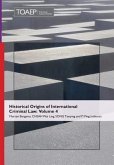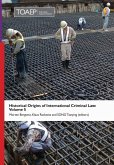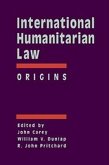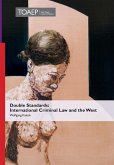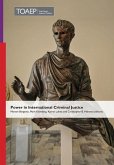This volume carries on the "comprehensive and critical mapping of international criminal law's origins" started by the previous two volumes. Twenty-seven authors investigate the evolution of legal doctrines and pertinent historical events, many in an attempt to inform contemporary theory and practice. Contributors include Narinder Singh, Eivind S. Homme, Manoj Kumar Sinha, Emiliano J. Buis, Shavana Musa, Jens Iverson, Gregory S. Gordon, Benjamin E. Brockman-Hawe, William Schabas, Patryk I. Labuda, GUO Yang, Philipp Ambach, Helen Brady, Ryan Liss, Sheila Paylan, Agnieszka Klonowiecka-Milart, Meagan Wong, Marina Aksenova, Zahra Kesmati, Chantal Meloni, Hitomi Takemura, Hae Kyung Kim, ZHANG Binxin, Morten Bergsmo, CHEAH Wui Ling, SONG Tianying and YI Ping. Part 1 of the book further expands the landscape of international criminal law in terms of geography, time and diversity of legal concepts in their early forms. Parts 2 and 3 turn to the origins and evolution of specific doctrines of international criminal law. Part 2 explores four core international crimes: war crimes, crimes against humanity, genocide, and aggression. Part 3 examines doctrines on individual criminal responsibility: modes of liability, grounds of criminal defence, and sentencing criteria. The doctrine-based approach allows vertical consolidation within a concept. The chapters also identify common and timeless tensions in international criminal law, symptomatic of ongoing struggles, offering parameters for assessment and action.
Hinweis: Dieser Artikel kann nur an eine deutsche Lieferadresse ausgeliefert werden.
Hinweis: Dieser Artikel kann nur an eine deutsche Lieferadresse ausgeliefert werden.


